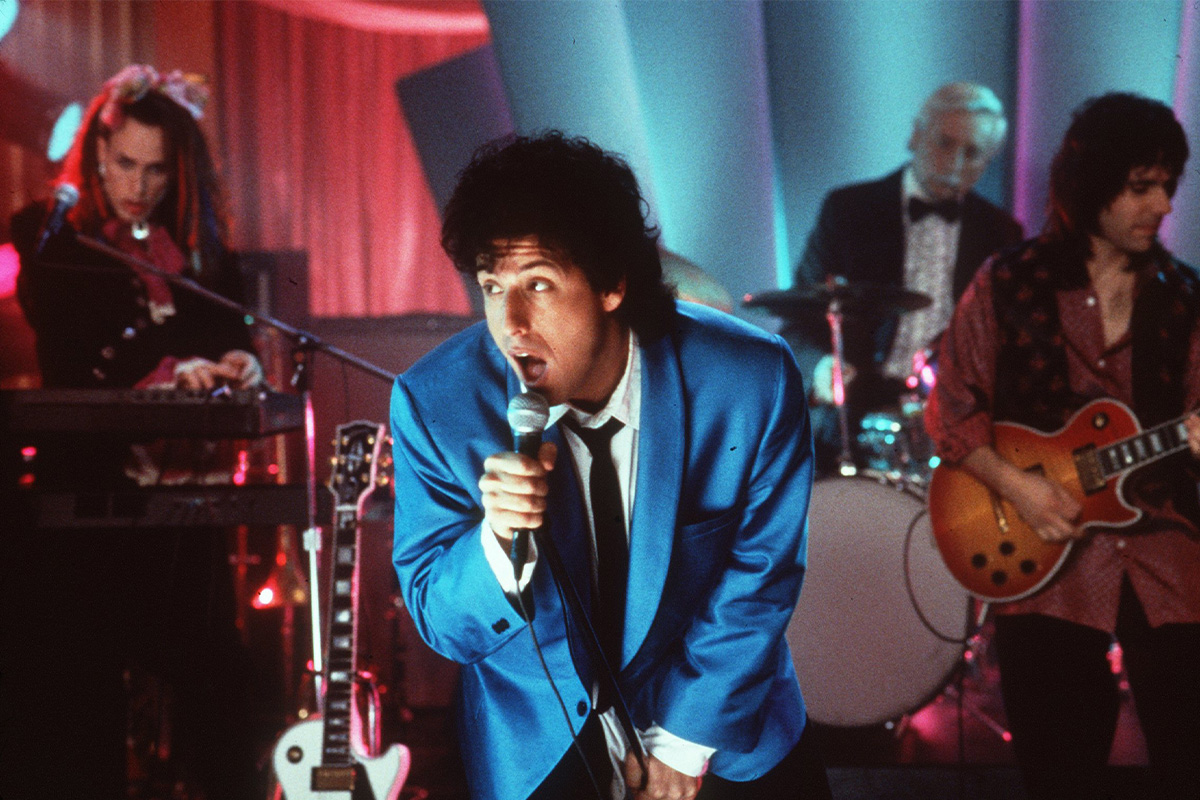Outside of my extended family, the first person that I ever heard say the words “mazel tov” was Adam Sandler.
I first watched “The Wedding Singer,” one of many iconic Adam Sandler/Drew Barrymore romance movies, when I was 11 years old. As I peered over the shoulders of my parents during their nostalgic movie night, there was a lot that confused me (the “Miami Vice” references, the sexual innuendos, the leg warmers…), but one thing was clear: This movie was tremendously Jewish.
It wasn’t just the bar mitzvah scene, during which wedding singer Robbie Hart (Sandler) reveals that he’s begun taking on b’nei mitzvah gigs, when the movie reminded me of my own Jewish experience. Rather, it was everything about Robbie’s world — from his thick, curly hair (albeit in mullet form), to his doting, often-inappropriate neighbor (Ellen Albertini Dow), to the luxurious amounts of self-pity and lamentation throughout the film. To my sixth-grade self, everything about the movie screamed “Jewish.”
As I grew up, and as both the storyline and crude humor began making more sense to me, I only fell deeper in love with “The Wedding Singer.” Not only was I more able to understand the explicitly Jewish references in the film, but I began seeing inklings of Robbie’s Jewishness — or, at the very least, the characteristics that I might associate with my own Jewishness — peeking out of the movie’s plot and premise. I would knowingly smile as I listened to Robbie instruct Julia (Barrymore) about how to get a good deal on flowers, his endearing, self-deprecating humor, and his expert, almost-prodigal complaining about his terrible lot in life (I could spend another article, alone, on why “Somebody Kill Me” should be considered a Jewish anthem).
As someone who was, and still is, always struggling to determine my connection to Judaism, I found extreme comfort in “The Wedding Singer.” Every time I watched the movie, it felt like coming home.
Today, all of the important non-Jews in my life have seen “The Wedding Singer.” The movie serves as a type of crash course — not necessarily on Jewish culture in general, but on how Jewish culture has manifested itself in my life. Not only has “The Wedding Singer” given me the opportunity to show my friends what dancing the hora looks like, or teach them what a bris is, but it has also allowed me to show them what kind of Jewish characters exist in my life. From my kvetching neighbors to my kvelling relatives, I see pieces of the Jewish people that I love most in the film. More importantly than that, “The Wedding Singer” has allowed me to show them the Jewish characteristics that exist within me. As I continue to feel my way through my Jewish life, this movie has explained my relationship with Jewish culture to others far more eloquently (and far more hilariously) than I ever could.
While I refuse to take ownership of the movie’s overwhelming campiness, sometimes-problematic inclinations, and sheer quantity of big, 80s hairstyles, I cannot ignore that, for a significant portion of my life, “The Wedding Singer” was a refuge for my amorphous and ever-changing relationship to Judaism. While Robbie Hart might not exist in “real life,” I don’t think I’ll ever escape the feeling that I share his world. I might not have ever owned fingerless gloves, had a rapping grandmother, or said “Kiss my grits,” but, just like Robbie, I cannot and will not escape my Jewishness. While I am much more than the culture I come from, my Jewishness is embedded in my personhood, and “The Wedding Singer” was the first piece of media that, whether implicitly or explicitly, told me that this was alright.
So, to “The Wedding Singer,” I can only say thank you. Not only did you show me that other Jewish stories exist; you revealed to me that they do not have to be about Jews practicing Judaism to be salient, meaningful, and (sometimes) funny. You were one of the first catalysts on my journey towards knowing — and loving — my Jewishness. While you’ll never be the answer when someone asks what my favorite movie is, you will always be my first answer when someone asks me about what makes me feel Jewish. Don’t you think that’s more important, anyway?
Late Take is a series on Alma where we revisit Jewish pop culture of the past for no reason, other than the fact that we can’t stop thinking about it?? If you have a pitch for this column, please e-mail submissions@heyalma.com with “Late Take” in the subject line.




